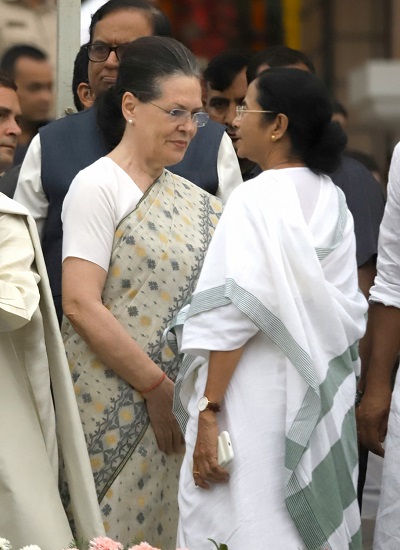Kolkata, (Asian independent) As Trinamool Congress supremo and West Bengal Chief Minister has made it clear that her party would contest independently from all the 42 constituencies in West Bengal in the Lok Sabha elections scheduled this year, a post mortem has started on the factors that prompted the TMC-Congress bonhomie to turn murky.
Now, while quoting the term “TMC-Congress bonhomie,” political observers here have also explained that this concept of sociability was not an overall factor between the Congress and the Trinamool Congress.
Rather, this sociability was more a personal bond between Mamata Banerjee and Congress leader Sonia Gandhi as well as some other national leaders of the country’s oldest national party like Abhishek Manu Singhvi, P Chidambaram and Jairam Ramesh.
Where the West Bengal Pradesh Congress Committee (WBPCC) is concerned, political observers say, the equation of the Chief Minister with almost all state Congress leaders, especially the party’s state President Adhir Ranjan Chowdhury, was always acrimonious.
People are wondering why the state Congress unit’s hardcore “anti-TMC” stand gained supremacy over that of the “pro-TMC” section of the central leadership and that too in a thoroughly high command-driven party like the Congress, which ultimately prompted Mamata Banerjee to announce that her party would go it alone in the Lok Sabha elections.
Political observers say that many factors aided state Congress leaders, especially Chowdhury to convince the high command that the Trinamool Congress’ principal aim was to weaken the Congress and indirectly help the BJP and hence the ruling party in West Bengal could not be trusted.
Political observers opine that the first factor that fuelled the mistrust was the Chief Minister’s stand on the last elections for the country President and Vice-President.
At a time when all anti-BJP forces led by the Congress and even the TMC’s arch- rival CPI-M agreed to back the erstwhile Trinamool Congress’ National Vice- President Yashwant Sinha and officially announced their support, a comment by Mamata Banerjee came as a shocker.
She said had the BJP informed her that it was fielding Droupadi Murmu for the President’s post; she would have given a thought to supporting her candidature.
The second shocker by the Trinamool Congress came during the elections for the Vice-President’s post, when it decided to abstain from voting instead of casting its ballot in support of the Congress-backed Opposition candidate Margaret Alva.
Neither the Congress, nor its friends, bought the Trinamool Congress’ logic that the decision to abstain from voting was taken because the call to field Margaret Alva was taken without consultation with the Trinamool leadership.
The next shocker came after the by-elections last year for the Sagardighi Assembly constituency in minority-dominated Murshidabad district of West Bengal where the Left Front-supported Congress candidate Bayron Biswas emerged as a surprise winner and that, too, with a landslide majority.
However, the jubilation in the combined Congress-CPI-M camp over the victory was short-lived, as within a couple of months after clinching that victory Biswas joined the Trinamool Congress in the presence of the party’s General Secretary Abhishek Banerjee.
Since then state Congress leaders led by Chowdhury became more vocal about their theory of the Trinamool Congress playing the role of clandestine benefactor of the BJP by weakening the Congress.
Next was the factor of Naushad Siddique, the lone All-India Secular Front (AISF) representative in West Bengal Assembly expressing the desire to contest from minority-dominated Diamond Harbour Lok Sabha constituency in South 24 Parganas district, where the sitting MP is Abhishek Banerjee.
As both CPI-M and Congress took an in-principle decision to give conditional support to Siddique’s candidature from Diamond Harbour, the Trinamool Congress leadership accused Siddique of being a clandestine benefactor of the BJP by making attempts to divide the minority votes.
Trinamool also accused the Congress and CPI-M of fuelling that attempt.
Given this background, there was major mistrust between a large section of the Congress and the Trinamool, even after they became a part of the INDIA bloc.
At the same time, the importance given to the CPI-M General Secretary Sitaram Yechury in the INDIA bloc added to Mamata Banerjee’s irritation, which she revealed while speaking at a public meeting in Kolkata on January 22.
“The name ‘INDIA’ was my brainchild, but I feel sad when I see that the CPI-M is being allowed to control the agenda of the Opposition bloc meetings. I can never accept that. I feel sad since we have struggled for 34 years to end the CPI-M-led Left Front rule in West Bengal,” she said on that day.
Finally, as pointed out by observers, Mamata Banerjee floating the name of Mallikarjun Kharge as the projected prime ministerial candidate in an INDIA bloc meeting and suggesting that Priyanka Gandhi contest from Varanasi against Prime Minister Narendra Modi fuelled the mistrust of the Congress against the TMC further.








